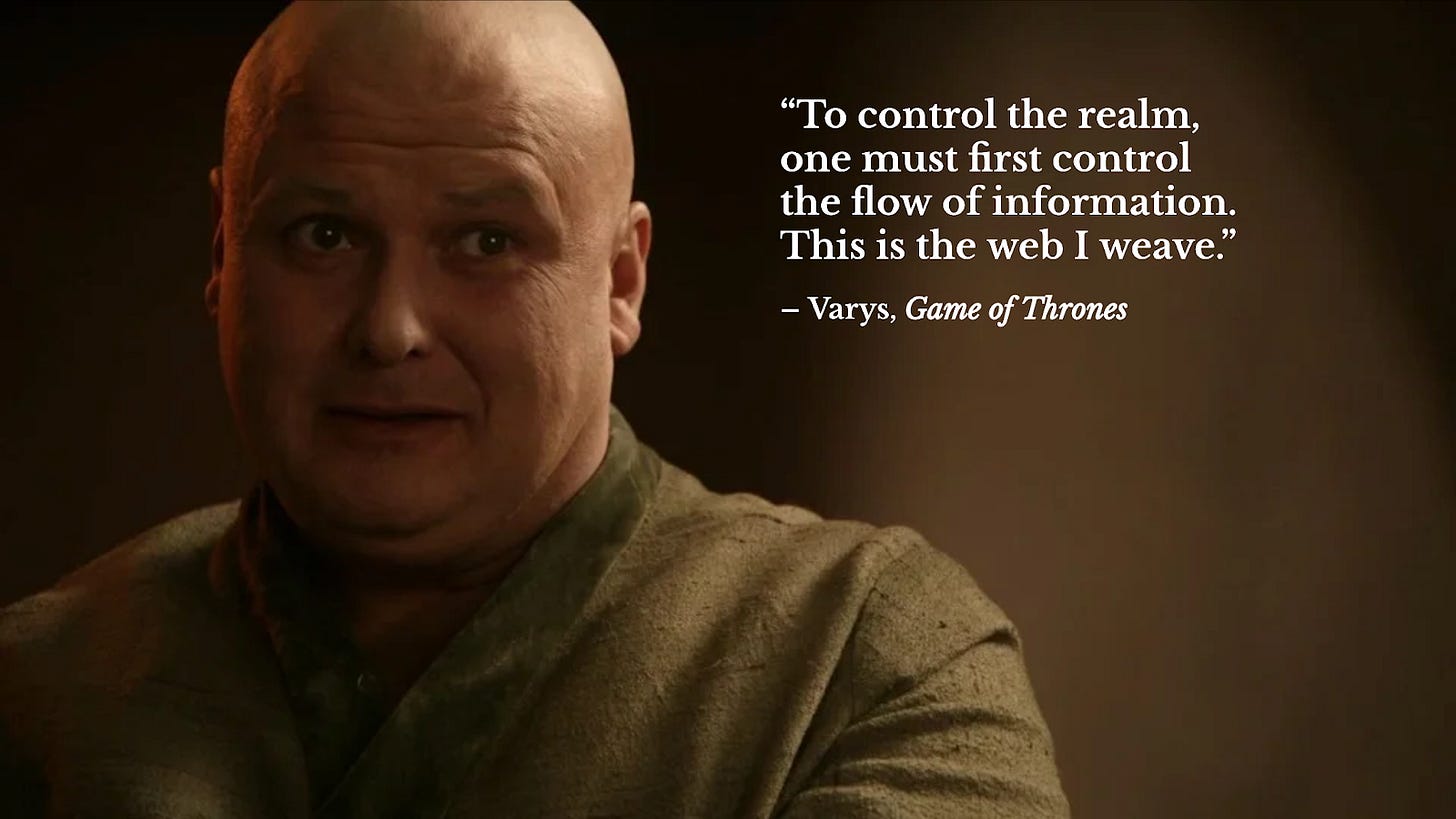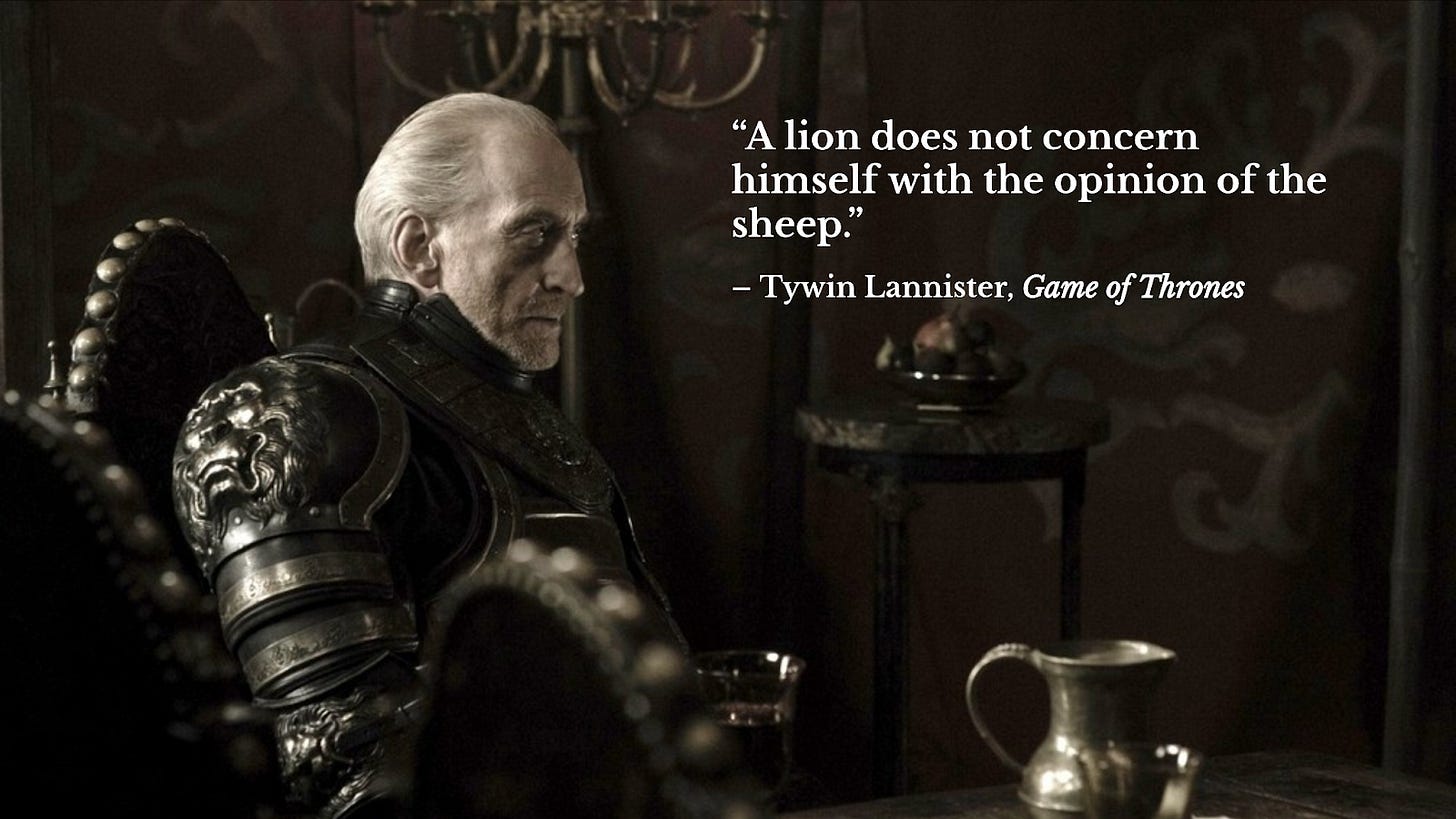The Two-Party Trap (in office politics)
Are you an Idealist or a Schemer? [Not Obvious: Part 6]
The Way of Work explores stories of where we fit in the world of work. This is part of the series, Not Obvious, exploring why work advice fails us:
Part 1: Why Work Advice Fails Us (intro)
Part 2: Burnout, Balance, and the Bullshit in Between (on “hard work”)
Part 3: You Will Never Feel Done (on “productivity”)
Part 4: Welcome to Management: Please Proceed With Delusions of Control (on “management”)
Part 5: Fulfillment FOMO (on “passion”)
Every workplace is political. The question is: which side are you on?
On one side, are the Idealists. They think they are above politics.
They bring their whole selves to work. They focus on the work, their performance speaking for itself. Politics is what other people do.
On the other side, are the Schemers. They embrace politics and “play the game to win.”
They go full on Machiavelli, treating every interaction as a strategic move in a power game. Work isn’t about work, it’s a game of self-promotion, manipulation, and ladder-climbing. Anything goes on the way to the top.
At the start of any career, and every day after, we all have a vote: which party do we pick?
I’ve tried both sides.
I started as an Idealist. Head down, believing results would speak for themselves. And it worked, at least for a while. But as I moved up, from a junior level to SVP, the stakes changed. I found myself entangled in shifting alliances and an org chart in flux. Suddenly, great work wasn’t enough:
“I was no longer considered one of the top performers and missed a few promotions. I went through 5 different bosses in less than 2 years.” - Fluidity: How to continually reinvent yourself (in a world of change)
So I adapted and played the game. I embraced the role of a Schemer, a chameleon tuned to power dynamics. I knowingly played the relationships, shifting others in my favor. And honestly? That strategy worked too. But I lost something in the process…
“‘Other people think you are a mercenary and you will slit their throat to hit your goal.’ - feedback given to me as part of my performance review.” - From early startup to $2B public company, what 12 years at Privia Health taught
So, which side do you choose?
I. Do you stay authentic or filter yourself?
If you’re fully yourself, are you prepared for the consequences?
They didn’t mention this in that motivational seminar: other people might not like “the real you.”
I’ve seen how my “radical candor” turned into “difficult to work with.” How others didn’t appreciate my style of directness (which can be quite abrasive). They wanted silence and soft landings. So much for being myself.
Others would rather you bring your “best self” to work and not your “real self.” By being authentic, you think you are choosing integrity, but are you really choosing naïveté?
If you filter yourself, you will die a million deaths before your career is done. A silence in a meeting. A compromise you didn’t believe in. A gut instinct ignored. Every edit, denying yourself.
I too took on this mask for a few years on my way to becoming a senior executive. I was safe. Acceptable. Promotable. And unrecognizable.
Watch as your view of yourself erodes. As you step in line, your soul steps out. Your identity outsourced. A version so filtered down, you barely know who you are any more.
You think it’s a strategy, but is it more like surrender?
Which side do you choose?
II. Do you focus on the tasks or the tricks?
If you only focus on the work, how are you sure it will be seen? Will others help or block your way?
I’ve built something I deemed very valuable – only to watch it get ignored, delayed, and blocked by someone with better relationships (and worse ideas).
People who reject politics often end up frustrated, watching less competent but savvier colleagues pass by while they stay stuck. You may think you are being useful, but what if no one else agrees?
And if you are a leader, your idealism will become a liability. See as your team’s work crumbles under the weight of another exec’s ego. See as it gets killed off in a cross-functional knife fight you chose to ignore.
If you only focus on the maneuvers, when will the work actually get done? Eventually, people start asking: What do you actually do?
Being likable is nice, but it’s not the same as being respected or having influence. And when others realize you’re more style than substance, you’ll quickly lose both.
Avoid real work and you’ll soon be out of work.
Which side do you choose?
III. Do you align with power or stay independent?
If you align with power, you may rise faster. Careers are often built this way, by riding the wave of someone else (mine too). But when does loyalty turn into blind allegiance?
When you follow power, you need to accept their destination, including where it ends. I rode the power of someone for 6 years, but when they left, I had to scramble for my own survival, as I reported to 5 different bosses over the next 2 years.
Power shifts. It fades. Power might leave. Or turn on you. The same person who built you up may later hold you back, resenting your rise. Rely on one champion at your own risk.
If you stay independent, you get to chart your own course. But you may drown. You may be on your own, but that means you are on your own.
You’re free, but exposed. Principled, but alone.
When you need help, see how few volunteer to your aid. Instead of bridges, there’s walls between you. Notice, even, how others may be a little excited to see you struggle.
Which side do you choose?
IV. Do you play or get played?
If you play to win, eventually people will see right through you. It’s hard to treat every interaction as a power move without the deception seeping through your mask. One truly remarkable asshole comes to mind here…
You might win in the short term, but the reputation will catch up to you. Those who are too obvious about their maneuvering will soon find defensive rivals, intent on thwarting their moves.
Politics is like flirting, overt action spoils the game.
If you opt-out of politics entirely, it may be you who gets played. People who say, “I don’t do office politics,” are still in the game, just playing poorly.
You will certainly hit a ceiling (as I did, before I accepted the game). Beyond a certain point, it’s not about performance, it’s about perception and positioning. Who supports your work? Whose ideas get funded? Opt out of politics, and you’ve just opted out of important decisions, too.
Some companies claim they have “no politics.” What that means is: we’ve already chosen who holds power, and we don’t want you questioning it.
Which side do you choose?
V. The Paradox of Politics
Me? I’d call myself a Moderate-Idealist. I still hope the quality of my will speak for itself, and maybe even get rewarded someday by karma. But I’m willing to switch into Schemer-mode (begrudgingly) when I have to; e.g. time to get budget approved, survive until the next bonus hits the bank account.
I’m fine with Idealists, but detest Schemers – I’ve seen them infect and destroy a culture faster than it was built.1 In the end, I still hold out hope for the fantasy, but have come to accept the reality.
The problem is the two-party system can create a false choice. An either/or illusion in a world that’s far messier. Most people think there is a “right side,” but that’s the trap: there is no safe side. The enemy isn’t politics, it’s being naïve about how things work.
Conventional wisdom, it seems, gets it wrong on both ends:
“Work hard and be nice” pretends that power doesn’t exist.
“Play the game to win” assumes you can win without losing something.
Play too hard, and you lose yourself. Stay too pure, and you lose your seat. Every move shifts your standing, your story, your shot.
Others may have their side, but ultimately, you must find your own.
Bonus: Ambiguous Advice
▸ "Bring your whole self to work."
Except all those weird parts we don’t want to see.
▸ “Be a team player.”
i.e. smile, nod, and shut the hell up.
▸ “Play the game to win.”
I never let my daughter win Candy Land.
▸ “Just focus on doing great work.”
Everyone will definitely notice. Eventually. Maybe. Probably not.
Next up, I explore the concept of being “successful.” Subscribe to stay tuned.
If you’ve enjoyed The Way of Work: comment, ❤️ or 🔄 below and/or share it with a friend.
An astute reader may notice I “detest Schemers” while also admitting to have been one. My response is simply: “yes.”















The real tragedy I see is that so many people fail to consciously pick a strategy--any strategy--for their own careers.
Dave Anderson has a good breakdown https://www.scarletink.com/p/the-hidden-advantage-of-sharp-edges that puts it into a 2 by 2 of takers, givers on one axis and agreeable disagreeable on another. I think it corresponds well to your framework but gives a bit of nuance - I think your position is disagreeable giver which is prosocial (idealist) but also focused on doing the right thing instead of focusing on themselves.